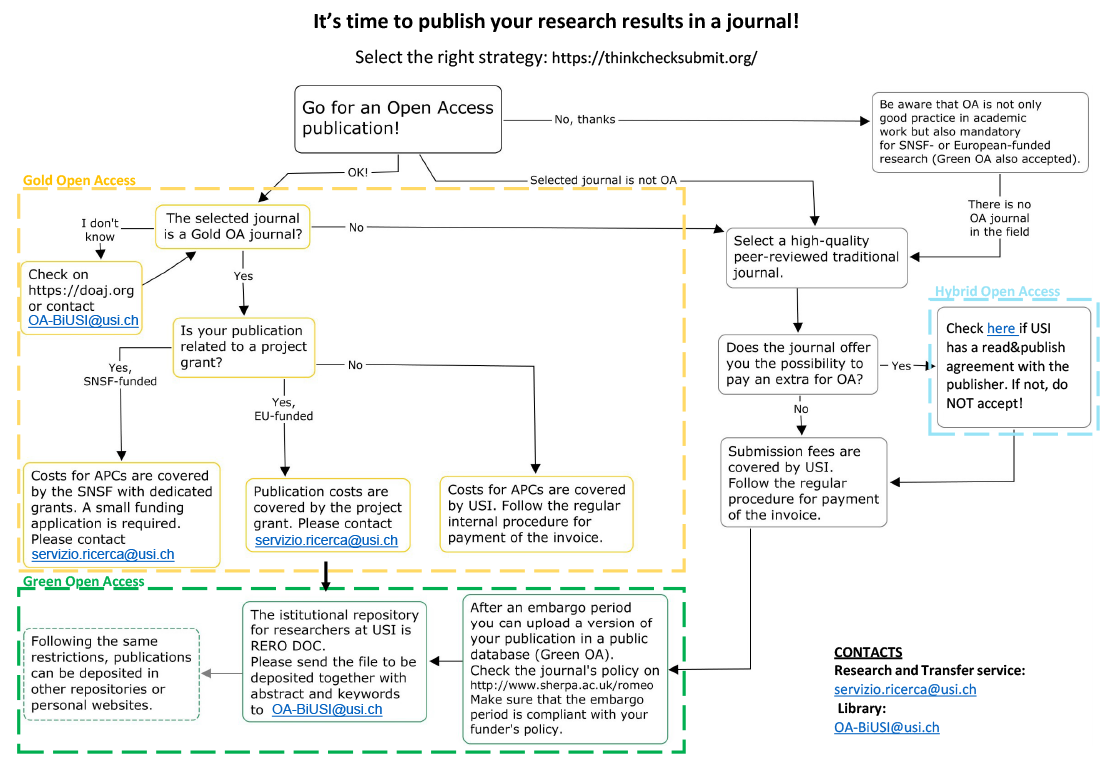- Know the collections

- Expand your research

- Discover the library

- Loan and request

- Write and cite

- Publish and deposit

Open Access (OA) means free access to scientific information over the internet.
"Open access (OA) literature is:
- digital
- online
- free of charge
- and free of most copyright and licensing restrictions"
(Suber 2012, 4).
Researchers who publish articles or books in OA or upload their publications to a specialized repository make research accessible worldwide, granting access to the most up-to-date scientific information also to people working outside research institutions or living in underdeveloped countries, where access to traditional pay-per-view content by big publishers is simply too expensive. OA is supported on a global scale by many scientific organizations, libraries, universities and research institutions (see for example the list of signatories of the Berlin Declaration on OA to which USI has adhered in 2016 as 552nd istitution).
For several decades, the scientific community has been facing more and more disproportionate cost increases from many scholarly journals. The reasons for this so-called “serial crisis” are complex, but an essential factor is the quasi-monopoly of several publishers. Researchers, working in the environment of financially secure institutes, often do not face the problem directly. However the visibility, re-use and impact of their scientific research suffer from the limitation of access by price-barriers. Through this lens, it is clear that open access to research results should be enforced.
The results of research financed by public funds should be published electronically so that they are freely and immediately available without charge and can thus be reused by third parties, since they are considered as a public good. Several studies have shown that OA helps boost the visibility of research among researchers, the media and the general public. It thus promotes the transfer of knowledge, the rationalisation of resources and the efficiency of research, while accelerating scientific progress. Increasingly, OA is regarded as a new standard of excellence for scientific research, offering new opportunities for funding, partnerships and jobs, most appropriately so in countries with a particularly knowledge-based economy like Switzerland.
In Switzerland, several institutions connected to scientific research and its publication have developed OA policies:
- The Swiss National Science Foundation (SNSF) requires that, in principle, all publications relative to research it funded should be published in OA.
- The Swiss Academy of humanities and social sciences (SAGW) requires from all publishers receiving its financial support that they develop an OA policy before 2020.
- Swissuniversities, commissioned by the State Secretariat for Education, Research and Innovation, launched a Swiss National Strategy on Open Access that aimes at harmonizing the OA policies of Swiss universities, coordinate financial resources, promote alternative forms of publication, and communicating and raising awareness about OA. The aim of the strategy is that all scholarly publications funded by public money be Open Access by 2024 .
The Action plan to implement the National strategy has been approved by swissuniversities the Swiss conference of higher education institutions, and is thus officially in force.
USI as well will be concerned by the proposed measures, and it is likely that its researchers will soon be requested to comply to new OA requirements.
-
The Green Road:
self-archiving a version of one's publication in the Istitutional Repository of the university or in disciplinary or trans-disciplinary repositories. RERO DOC is the Istitutional Repository for researchers at USI. Please contact the library for any information regarding the upload of publications to RERO DOC. -
The Gold road:
articles or books are directly published online, usually in an Open Access journal or an Open Access ebook platform.
For example:
the DOAJ - Directory of Open Access Journals platform lists and informs about OA journals of high quality and trustworthiness.
The project OAPEN displays ebooks in OA published by many academic publishers, in Switzerland as well as worldwide.
- Techne. Journal of Technology for Architecture and Environment
- Scienze del Territorio
- Ri-Vista. Ricerche per la progettazione del paesaggio
- Rivista di Studi di Fotografia
- Opus Incertum
- Arena Journal of Architectural Research
- Macramè. Trame e ritagli dell'urbanistica
- EdA Esempi di Architettura on.line
- ArcHistoR architettura storia restauro - architecture history restoration
- Interaction Design & Architecture
Publication portals:
DOAJ lists (Subject: Fine arts):
Lists should be considered non-exhaustive
- Support and information
-
-
OA-BiUSI@usi.ch
Phone: +41 058 666 4501
-
OA-BiUSI@usi.ch
- Useful links
-
Budapest Open Access Initiative. Read the Budapest Open Access Initiative. http://www.budapestopenac
cessinitiative.org/read Consulted 1 July 2021. - Salucci, Giovanni. 2016. “Glossario dell’open access”. Zenodo. doi:10.5281/zenodo.1208418
- Suber, Peter. 2012. Open Access. Cambridge, Mass.: The MIT Press. Pdf download - Open Access
- Swiss National Science Foundation (SNSF). Open Access to Publications. http://www.snf.ch/en/the... Consulted 1 July 2021.
- Universitätsbibliothek, Universität Bern. Open Access. http://www.unibe.ch/univer... Consulted 1 July 2021.
-
Budapest Open Access Initiative. Read the Budapest Open Access Initiative. http://www.budapestopenac
- Background image
-
-
